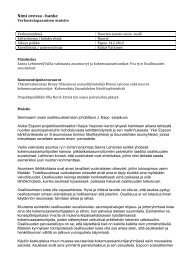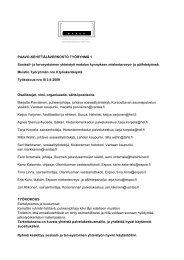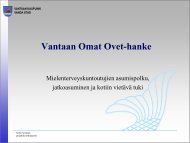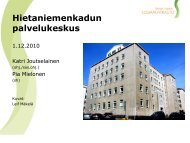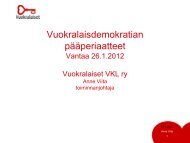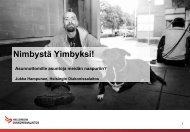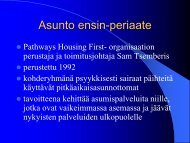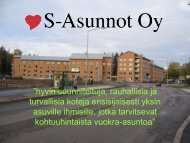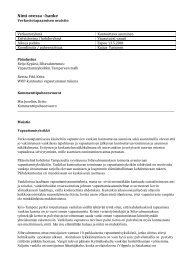The Glasgow Hostel Closure Programme: Findings ... - Asunto ensin
The Glasgow Hostel Closure Programme: Findings ... - Asunto ensin
The Glasgow Hostel Closure Programme: Findings ... - Asunto ensin
Create successful ePaper yourself
Turn your PDF publications into a flip-book with our unique Google optimized e-Paper software.
<strong>The</strong> <strong>Glasgow</strong> <strong>Hostel</strong> <strong>Closure</strong><strong>Programme</strong>: <strong>Findings</strong> from aLongitudinal EvaluationPresentation to the First Meeting ofGrundtvig Learning Housing First in EuropeProjectSuzanne Fitzpatrick, 25 January 2012
<strong>The</strong> <strong>Glasgow</strong> <strong>Hostel</strong>s• Longstanding concerns about large-scale hostels run by<strong>Glasgow</strong> City Council, NGOs and private sector• Originally designed to provide basic, short-termaccommodation; not equipped to provide intensive support forlong-term residents with complex needs• <strong>Glasgow</strong> Street Homelessness Review Team (2000) +Scottish Government funding = <strong>Hostel</strong> <strong>Closure</strong> <strong>Programme</strong>• Start of process GCC had 4 x 240 bed male hostels; singlerooms; very little support; severe problems of druguse/dealing, violence, suicide, money lending, etc.• All four hostels closed between 2000 and 2008, to be replacedby mainstream tenancies/smaller-scale supported units
Evaluation Aims andMethods• To examine the resettlement outcomes for exresidentsof the last two hostels to be closed down:Peter McCann House (2006) and James DuncanHouse (2008)• Method 1: interviews with service providers (n= 22)• Method 2: longitudinal survey of ‘ring-fenced’ exresidents:Wave 1 (average 19 months after lefthostel; n= 89); Wave 2 (average 33 months after lefthostel; n= 60)• Started in July 2007; final report published July 2010
Profile of Sample• Age: 46% under 50; 54% over 50; and great majority were from<strong>Glasgow</strong>• Accommodation type: 45% in permanent; 55% in supported• Homelessness experiences:- 53% had stayed 5 or more years in <strong>Glasgow</strong> hostels (30% formore than 10 years)- 55% had slept rough (18% for more than one year)• Health: generally very poor; 42% had an alcohol problem(mainly over 50); 29% used drugs (all under 50)• Personal history:- prison - 74% of under 50s, 35% of over 50s- care - 33% of under 50s, 11% of over 50s
Resettlement Process• Over 80% happy with accommodation arranged forthem; 72% (Wave 1) and 63% (Wave 2) still in thesame accommodation• A minority had experienced homelessness (16%); butvery few had slept rough (2%) (also other evidencethat very few had become homeless/slept roughagain)• Felt supported?: 56% ‘always’; 7% ‘usually’; 20%‘neglected’; 14% ‘mixed feelings’
Outcomes: Housing• Supported: great majority reported that the staff were‘very helpful’ and no problems sharing• Permanent: 60% said running their own home was‘easy, no problems’; 38% said ‘mainly ok, but someproblems’; and 2% found it ‘difficult’; no evidence ofproblems with neighbours• High levels of satisfaction with safety,neighbourhood, facilities, furnishings and space;especially high in supported accommodation;problems with dirtiness/disrepair in permanenttenancies
Outcomes: ProfessionalSupport• Support workers: 86% seen at least one typeof worker (Wave 1), 73% (Wave 2); mostcommonly housing support workers; theseworkers were generally highly rated• Support needs: 75% felt were getting all thehelp they needed (Wave 1); 83% (Wave 2)• Self-identified unmet needs varied widely butwere mainly practical (such as help withmanaging money/ debt)
Outcomes: Health, SocialSupport and Finances• Drug and alcohol use – strong and consistentevidence of reduced consumption• Physical and mental health – substantial netimprovements• Social support - significantly increased fromworkers (especially for over 50s), and fromfamily (under 50s)• Financial situation: 61% said better; 14%worse
Outcomes: Work and OtherDaily Activities• Economic status: 3% of under 65s were inwork; most were long-term sick/disabled• Other activities: few engaged in ‘structured’activities; many engaged in no regularactivities of any kind; repetitive and solitarydaily routines• Loneliness and boredom major problems(though marginally better than in hostel)
Outcomes: Overall Qualityof Life• Changes in quality of life: 61% said life was‘much better’; 22% said it was ‘better’; 11%said it was about the same; and 6% thoughtthat it was worse• One third (32%) missed something about thehostel• Almost all (90%) said there was at least onething better about their lives
Conclusions• <strong>Hostel</strong> closure succeeded in significantly improving lives of exresidentsof <strong>Glasgow</strong>’s large-scale hostels• Good outcomes achievable even for those with complex needsand long homelessness histories• Need political support; strong central coordination; goodresources; individual assessments• ‘Housing First’ approach broadly endorsed; but also need for‘permanent supportive housing’ (older men) and ‘transitionalaccommodation’ (younger men)• Main weakness: lack of attention to work and other purposefulactivity (especially for under 50s)• http://www.york.ac.uk/inst/chp/Projects/glasgowhostels.htm



